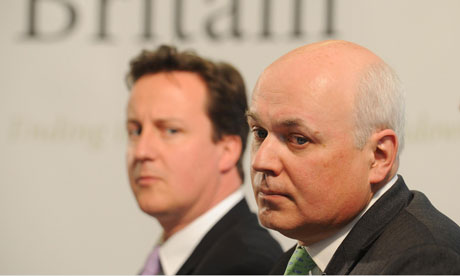It is our duty to protect Legal Aid
Article published: Wednesday, May 11th 2011
Ryan Bradshaw discusses the threat to legal aid and welfare benefits.

David Cameron and DWP minister Iain Duncan Smith
As a practitioner of welfare benefits law I am privileged to spend my working day helping out those less fortunate than myself. Old and young, sick and well, from the uneducated to the highly educated, all of my clients are in some way dependant on welfare benefits and free legal advice. Unfortunately come the year 2013, should the government’s proposals to slash legal aid be passed, many of these people will be left to defend their rights without expert help.
The government’s proposals have been described, by the Law Society, as “a devastating attack on access to justice”. While such a statement may seem somewhat hyperbolic, the reality is that it is an entirely reasonable one to make. The government is working under the assumption that the average person can defend themselves in court against a private company or public body; this is not the case. There is a clear danger that a large section of society will not be able to right wrongs against them because they cannot afford to pay the legal fees. The government argues that to fill this gap in access to justice voluntary and charitable bodies will step in; research suggests that these organisations simply do not have the capacity to do so.
It is all the more unfortunate that the proposal to remove welfare benefits advice from the scope of Legal Aid should come at a time when it is suspected by some economists that government cuts are going to leave increasing numbers of people unemployed.
The changes being made to the system of welfare benefits are cause for serious concern among many of those familiar with them. There is a growing consensus that at least some unintended consequences of the Welfare Reform Bill will run contrary to the stated aims of the government and that the most vulnerable in our society will suffer as a consequence.

Manchester Advice
As an example many sick and disabled people are now required to pass medical assessments in order to access sickness benefits. It is the belief of many welfare rights advocates that these medicals are not fit for their purpose as part of the Department of Work and Pensions (DWP) decision-making process. It is contended by the Ministry of Justice Select Committee that ongoing problems in DWP decision-making will lead to an increase in the number of people appealing adverse decisions from 370,000 in 2010/11 to 436,00 in 2011/12. These figures seem to indicate that now is the time to put more money into legal aid for welfare benefits. Without freely available expert advice it is hard to see how the sick and vulnerable are expected to defend themselves against complex legal arguments in front of a tribunal and there is a serious risk that injustices will result.
Another cause for concern is the recent news that a whistleblower at the DWP had alleged that targets are issued to incentivise Jobcentre staff to remove people from benefits. In his interview the whistleblower highlights the fact that it is “not the hardcore benefit cheats who are affected by this but the vulnerable”. More alarmingly the government issued a statement that rejected these claims as “claptrap and conspiracy” only to later admit, after others spoke up, that such a system of targets is actually in place.
It is also worth considering that the welfare benefits system is our insurance against the vagaries of life and that we are all a p45 or illness away from being part of it. It is crucial that vulnerable people’s access to justice is given as high a priority as possible. For those who are still not convinced of the necessity of providing legal aid for welfare benefits advice, research carried out by Citizens Advice Bureau has indicated that for every £1 spent on Legal Help in welfare benefits the state saves a potential £8.80, due to the avoidance of adverse consequences. This clearly indicates that the proposed cuts to Legal Aid are not only morally but also financially questionable.
It is our duty, as good citizens, to protect Legal Aid, not just for welfare benefits but across the whole spectrum of the law. As Alexander Hamilton said “The first duty of society is justice”.
————–
You can help save legal aid and protect our welfare benefits system by writing to your M.P through http://www.writetothem.com/ and joining the campaign at http://soundoffforjustice.org/.
If you require advice on your entitlement to benefits contact Ryan Bradshaw on 01942 77 42 45.
More: Opinion
Comments
No comments found
The comments are closed.



